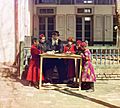Diaspora facts for kids
Diaspora is a word that describes a group of people who live outside their original homeland. It's like seeds being scattered from their plant and growing in new places. These people move away from where they or their ancestors came from and create new communities in different parts of the world.
The word "diaspora" first came from an ancient Greek translation of the Hebrew Bible, called the Septuagint. It was used to talk about the scattering of Jewish people after their city, Jerusalem, was captured by the Babylonians around 586 BC.
Contents
What is a Diaspora?
A diaspora happens when a large group of people leaves their home country and spreads out to live in many other countries. These people often keep strong connections to their original culture, traditions, and even their homeland. They might share a common history, language, or religion.
Why Do People Form Diasporas?
People move for many different reasons, leading to the formation of diasporas. Some common reasons include:
- Looking for Opportunities: People might move to find better jobs, education, or a chance for a better life.
- Escaping Problems: Sometimes, people leave their homes because of wars, natural disasters, or difficult living conditions.
- Historical Events: Big events in history, like famines or political changes, have caused large groups of people to move.
- Trade and Exploration: In the past, traders and explorers sometimes settled in new lands, starting new communities.
Keeping Culture Alive
Even when people live far from their homeland, they often work hard to keep their culture alive. This can involve:
- Speaking their native language at home.
- Celebrating traditional holidays and festivals.
- Cooking and sharing traditional foods.
- Building community centers or places of worship that reflect their heritage.
- Teaching their children about their history and customs.
Examples of Diasporas
Many different groups of people around the world have formed diasporas. These communities enrich the places they move to by sharing their unique cultures and traditions.
The Jewish Diaspora
As mentioned, the Jewish people were one of the first groups to be described by the term "diaspora." After being forced to leave their homeland centuries ago, Jewish communities spread across the Middle East, Europe, and later, the Americas and other parts of the world. They maintained their religious and cultural identity over thousands of years.
Modern Diasporas
Today, some of the largest diasporas include:
- The Indian Diaspora: Millions of people of Indian origin live outside India, making it the world's largest diaspora. They have spread across many continents, including the Middle East, North America, Europe, and parts of Asia.
- The Mexican Diaspora: This is the second-largest diaspora globally, with many Mexicans living in the United States and other countries, often for work or family reasons.
- The Chinese Diaspora: The third-largest diaspora consists of people of Chinese descent living in various countries, especially in Southeast Asia, North America, and Europe. They often establish vibrant "Chinatowns" that become cultural hubs.
- The Irish Diaspora: Following events like the Great Famine in the 1800s, many Irish people moved to countries like the United States, Canada, and Australia, creating large and influential Irish communities abroad.
- The Greek Diaspora: Historically, Greeks established colonies and communities across the Mediterranean and Black Sea regions. Today, significant Greek populations live in countries like the United States, Australia, and Germany.
These diasporas show how people can adapt to new environments while still honoring their roots and contributing to both their new homes and their ancestral lands.
Images for kids
-
The Chinese diaspora is the world's third largest; Paifang (torna) gateway at Chinatown, Sydney, Australia.
-
Emigrants Leave Ireland depicting the emigration to America following the Great Famine in Ireland
-
The Indian diaspora is the world's largest, Deepavali lights at Little India, Singapore.
-
Bukharan Jews in Samarkand, Central Asia, c. 1910
See also
- In Spanish: Diáspora para niños







